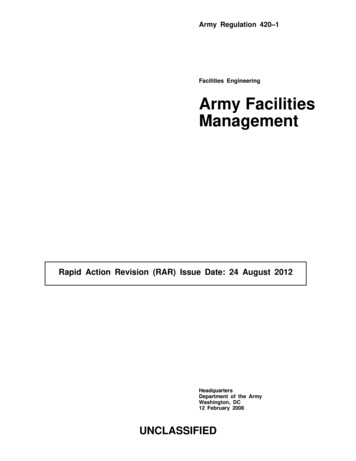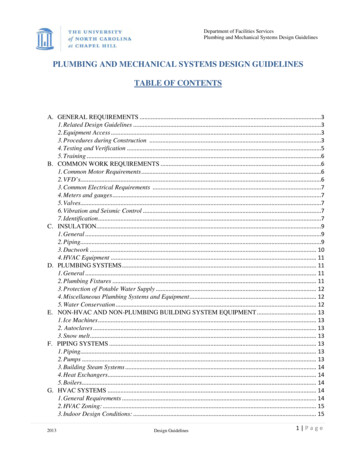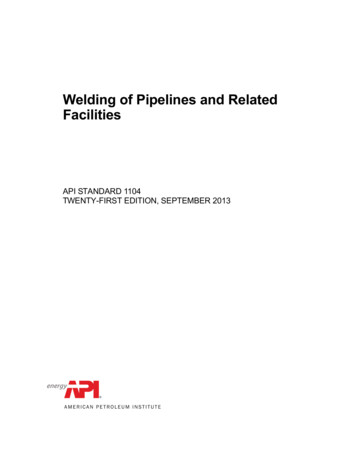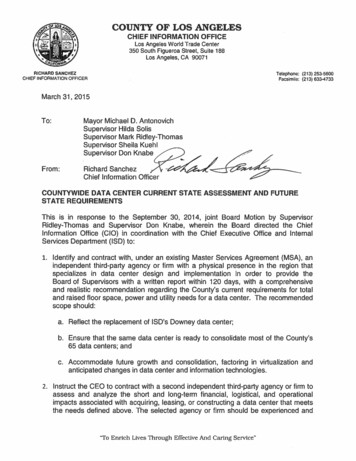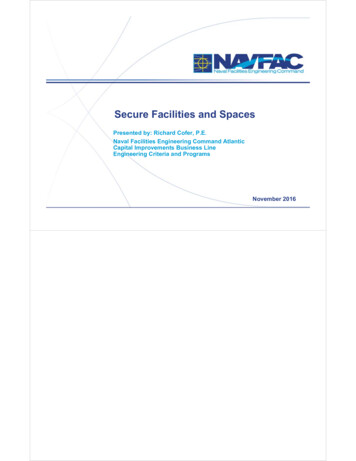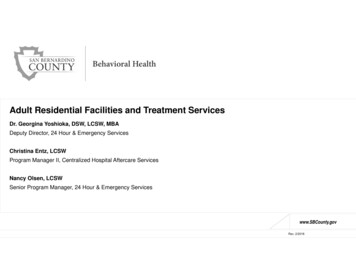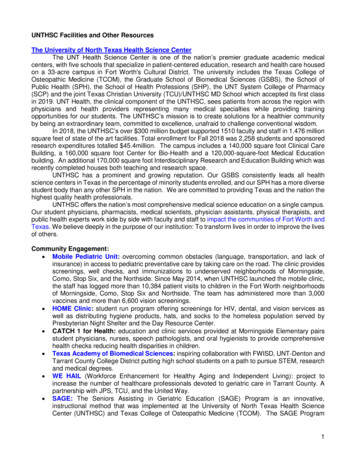
Transcription
UNTHSC Facilities and Other ResourcesThe University of North Texas Health Science CenterThe UNT Health Science Center is one of the nation’s premier graduate academic medicalcenters, with five schools that specialize in patient-centered education, research and health care housedon a 33-acre campus in Fort Worth's Cultural District. The university includes the Texas College ofOsteopathic Medicine (TCOM), the Graduate School of Biomedical Sciences (GSBS), the School ofPublic Health (SPH), the School of Health Professions (SHP), the UNT System College of Pharmacy(SCP) and the joint Texas Christian University (TCU)/UNTHSC MD School which accepted its first classin 2019. UNT Health, the clinical component of the UNTHSC, sees patients from across the region withphysicians and health providers representing many medical specialties while providing trainingopportunities for our students. The UNTHSC’s mission is to create solutions for a healthier communityby being an extraordinary team, committed to excellence, unafraid to challenge conventional wisdom.In 2018, the UNTHSC’s over 300 million budget supported 1510 faculty and staff in 1.476 millionsquare feet of state of the art facilities. Total enrollment for Fall 2018 was 2,258 students and sponsoredresearch expenditures totalled 45.4million. The campus includes a 140,000 square foot Clinical CareBuilding, a 160,000 square foot Center for Bio-Health and a 120,000-square-foot Medical Educationbuilding. An additional 170,000 square foot Interdisciplinary Research and Education Building which wasrecently completed houses both teaching and research space.UNTHSC has a prominent and growing reputation. Our GSBS consistently leads all healthscience centers in Texas in the percentage of minority students enrolled, and our SPH has a more diversestudent body than any other SPH in the nation. We are committed to providing Texas and the nation thehighest quality health professionals.UNTHSC offers the nation’s most comprehensive medical science education on a single campus.Our student physicians, pharmacists, medical scientists, physician assistants, physical therapists, andpublic health experts work side by side with faculty and staff to impact the communities of Fort Worth andTexas. We believe deeply in the purpose of our institution: To transform lives in order to improve the livesof others.Community Engagement: Mobile Pediatric Unit: overcoming common obstacles (language, transportation, and lack ofinsurance) in access to pediatric preventative care by taking care on the road. The clinic providesscreenings, well checks, and immunizations to underserved neighborhoods of Morningside,Como, Stop Six, and the Northside. Since May 2014, when UNTHSC launched the mobile clinic,the staff has logged more than 10,384 patient visits to children in the Fort Worth neighborhoodsof Morningside, Como, Stop Six and Northside. The team has administered more than 3,000vaccines and more than 6,600 vision screenings. HOME Clinic: student run program offering screenings for HIV, dental, and vision services aswell as distributing hygiene products, hats, and socks to the homeless population served byPresbyterian Night Shelter and the Day Resource Center. CATCH 1 for Health: education and clinic services provided at Morningside Elementary pairsstudent physicians, nurses, speech pathologists, and oral hygienists to provide comprehensivehealth checks reducing health disparities in children. Texas Academy of Biomedical Sciences: inspiring collaboration with FWISD, UNT-Denton andTarrant County College District putting high school students on a path to pursue STEM, researchand medical degrees. WE HAIL (Workforce Enhancement for Healthy Aging and Independent Living): project toincrease the number of healthcare professionals devoted to geriatric care in Tarrant County. Apartnership with JPS, TCU, and the United Way. SAGE: The Seniors Assisting in Geriatric Education (SAGE) Program is an innovative,instructional method that was implemented at the University of North Texas Health ScienceCenter (UNTHSC) and Texas College of Osteopathic Medicine (TCOM). The SAGE Program1
consists of an educational curriculum and community based outreach experience aimed atincreasing student opportunity for early exposure to older adults and issues in geriatrics.STEP: Safe Transitions for the Elderly Patient (STEP) program at UNTHSC provides transitionalcare to more than 800 Tarrant County patients, consistently keeping 30-day readmission rates 40percent or more below state and national averages and saving more than 350,000 annually inreadmission costs. STEP serves a diverse patient population with individualized, comprehensivecare that begins when a patient arrives home – care managed and coordinated by a homeassessment and care team consisting of a nurse practitioner or physician assistant, physicaltherapist, social worker, pharmacist and physician.Community Volunteering: Faculty, staff and students clocked 60,829 hours in one year withorganizations like Make a Wish, Habitat for Humanity, Tarrant Area Food Bank, and many more.Founding partner for Mayor Betsy Price’s FitWorth, Health City Initiative and of the 40-year-oldCowtown Marathon.Missing Person’s Unit: The nation’s only academic center based lab that uploads genetic datato FBI’s Combined DNA Index System (CODIS). Since 2003, UNTHSC has processed more than5,200 human remains leading to 1,500 DNA identifications.Science on Tap: is a partnership between the Fort Worth Science and History Museum and theUNTHSC, which brings UNTHSC researchers to the museum to talk about their research in anentertaining and interactive learning and social event for adults.Healthy Start: is a Health and Human Services Administration (HRSA) funded home-visitationprogram offered through the Department of Pediatrics serving pregnant and parenting womenand families. The focus on preventing infant mortality through asset-based education, access tohealth and social services and advocacy.The Building Bridges Initiative: funded by the Cancer Prevention and Research Institute ofTexas (CPRIT) is a community-based outreach, education and preventive health screeningprogram focused on refugee men, women and their families. Bi-cultural and bi-lingual healtheducators representing six different refugee groups/regions provide breast, cervical, liver andcolorectal cancer prevention education and facilitates screenings in one of ten languages in theNorth Texas areas.Healthy Moms-Healthy Babies-Healthy Community (H3): is a community-based initiativefocused on southeast Fort Worth. The mission is to reduce infant mortality by engaging individualsand communities to build a healthier Tarrant County. In short, the healthier a woman’s life is –throughout her life – the healthier her pregnancy, and her baby, can be. Connecting communitymembers to resources and support systems in their own community is one key factor in having ahealthier Life Course. The mission is to reduce infant mortality by engaging individuals andcommunities to build a healthier Tarrant County.Preconception Peer Education: is a program of the Federal Office of Minority Health and fundedby Texas Department of Health and Human Services. The program targets Texas college-agedmen and women with a preconception life course program designed to build healthier lives andreduce infant mortality.Mobile Vision Screening Program: The Mobile Vision Screening Program checks preschoolersin North Texas for common vision problems including nearsightedness (myopia), farsightedness(hyperopia), astigmatism, amblyopia (“lazy eye”), and asymmetric pupil diameters. The hope isthat by identifying and correcting vision problems early, students will have greater success in theclassroom.The North Texas Regional Institutional Review Board (NTR-IRB): The North Texas RegionalInstitutional Review Board (NTR-IRB), located at UNTHSC, is a collaboration of UNTHSC andother regional hospitals and institutions, responsible for regulatory oversight and protection ofthe welfare and rights of individuals who are subjects of research. The NTR-IRB is a“community/regional” IRB designed to facilitate review of human medical research (broadlydefined) and thus streamline the development and implementation of health research discoveriesthroughout the region.2
The Texas College of Osteopathic MedicineTexas College of Osteopathic Medicine (TCOM) is a leader in training physicians skilled incomprehensive primary care and rural medicine. Over 60 percent of TCOM’s graduates practice primarycare medicine, helping reduce the shortage of physicians in our Texas communities. Many otherssuccessfully practice in specialty careers ranging from aerospace medicine to cardiovascular surgery.From the first semester, students are provided the three pillar model of medical education with emphasison basic, clinical, and health systems sciences. Students will continue the clinical phase of their medicaleducation with core rotations in Internal Medicine, Surgery, Pediatrics, Obstetrics and Gynecology,Family Medicine, Psychiatry, Osteopathic Manipulative Medicine, Emergency Medicine and Geriatrics.TCOM excels through its innovative medical school curriculum, inter-professional education, cutting-edgeresearch, quality patient care, and outstanding student performance in both the classroom and clinics.Whether they are the only doctor serving a rural community or a specialist at a major medical center,TCOM graduates distinguish themselves as clinical leaders, teachers and scholars. TCOM has fouracademic departments: Family Medicine, Internal Medicine & Geriatrics, Pediatrics and MedicalEducation.The Texas College of Osteopathic Medicine’s affiliated graduate medical education programsinclude multiple primary care and specialty programs within John Peter Smith Health Network, HCA NorthTexas GME consortium, Methodist Charlton Medical Center, Bay Area Medical Center, Conroe MedicalEducation Foundation and Lake Granbury Medical Center.Research plays an important role in clinical and education practices. Between 20-25% of allTCOM students conduct an elective research project in the biomedical sciences, patient-oriented clinicalstudies or health services and policy during their four years at TCOM. Providing medical students with ameaningful research based educational experience is integral as medical students become exemplaryphysicians and informed consumers of medical research outcomes in the practice of evidence basedmedicine. Conducting a research project during medical school helps to build an academic track recordstrengthening residency applications and successfully matching for residency training. Under thedirection of a faculty mentor, the research experience is often tailored to meet the student’s interests.Options include a Pediatric Summer Research Elective, Honors Research Practicum, one monthResearch Elective, and Dual-Degree programs.The Texas Center for Performing Arts Health, formerly known as the Texas Center for Music &Medicine, is an interdisciplinary partnership led by the UNT College of Music and the UNTHSC TCOM.It also includes collaborations with the UNTHSC SPH, the UNT Denton based Colleges of Engineering,and Public Affairs and Community Service. Faculty across the UNT Denton and UNTHSC campuseswork together to study, treat, and prevent various occupational health problems associated with learningand performing music and other performing arts. Through these committed collaborations, students canenroll in specialized courses, select an optional related field of study in music medicine, participate inongoing research and outreach initiatives, and pursue their own research projects. The center providesspecialized clinical resources to both students and non-students. Clinical services for voice,musculoskeletal, auditory, and mental health concerns are available through the Music Medicine StudentClinic, and the Performing Arts Medicine Clinic at UNTHSC, as well as the UNT Denton’s Counselingand Testing Center, and Speech and Hearing Center.The Graduate School of Biomedical ScienceThe Graduate School of Biomedical Sciences (GSBS) of the UNTHSC, although young, has astrong record in graduate training. The mission of the Graduate School of Biomedical Sciences is toprepare graduates for careers as researchers, educators, and healthcare professionals throughinnovative training and research. Students can earn specialized master’s degrees in Biotechnology,Clinical Research Management, Forensic Genetics, Medical Sciences, and Medical SciencesInternational. The GSBS offers traditional research intensive Master’s and Doctoral programs inBiochemistry and Cancer Biology, Cell Biology & Immunology and Microbiology, Integrative Physiology,Genetics, Pharmaceutical Sciences & Pharmacotherapy, Pharmacology and Neuroscience, StructuralAnatomy & Rehabilitation Sciences and the Visual Sciences. The graduate programs are designed withan integrated, competency-based curriculum at its core that provides students with a broad foundation of3
knowledge in the biomedical sciences. Faculty research is funded by NIH, NSF, DoD, and privatefoundations. The GSBS also has several NIH funded academic programs that focus on the neurobiologyof aging, health disparities, and cardiovascular disease.The GSBS recognizes the importance of a diverse student population and research areas that derivefrom an understanding of all cultures. The GSBS has partnered with the Texas Center for HealthDisparities to provide research and educational opportunities for students from traditionally underserveddemographic groups. Importantly, GSBS has received a designation as a “Role Model Institution in theTraining of Minority Biomedical Scientists” by Minority Access, Inc., a National Institutes of Health (NIH)affiliated organization. In October of 2017 the school undertook a mass reorganization while at the sametime making a change in leadership. As a result, three academic departments were created along withthree areas of focus within the GSBS Administration which include Education, Student Services, andResearch. Department of Physiology and Anatomy Department of Microbiology, Immunology and Genetics Department of Pharmacology and NeuroscienceThe School of Public HealthThe School of Public Health (SPH) was accredited by the Council on Education for Public Health(CEPH) in June 2002. Currently, the SPH has 30 faculty members and approximately 325 students.The School offers the following degrees: Master of Public Health (MPH), Master of HealthAdministration (MHA), Master of Science (MS) in Public Health Sciences with concentrations inBiostatistics, Epidemiology, or Health Behavior Research, the PhD in Public Health Sciences withconcentrations in Epidemiology or Health Behavior Research as well as two dual degree programs:DO/MPH and MPH/MS in Applied Anthropology. The school also offers multiple graduate certificateprograms. The SPH focuses on research that advances knowledge on the etiology of public healththreats, and evaluates interventions and policies that prevent disease and promote health. The PhDcurriculum provides advanced training in a specialized field of public health that is grounded in strongresearch methods. The Mission of the School of Public Health is to create solutions for a healthiercommunity by advancing public health knowledge through research, service and the education of publichealth professionals. The SPH has two departments: The goal of the Department of Biostatistics and Epidemiology is to provide a collegialinterdisciplinary learning environment that produces strong researchers and public healthpractitioners who use biostatistics, epidemiology, and environmental health theories, principles,and methods to significantly improve health at the population level. Graduates from the mastersand doctoral programs have found employment in academia, public health departments, researchorganizations, and industry. The faculty in the Department have diverse expertise in areas suchas healthy aging, cancer, quasi-experimental trial methodology, surveillance, vaccinationprogramming, disaster preparedness, zoonosis, vector-borne diseases, and air pollution, as wellas in the development of novel statistical methods applied to clinical trials, neuroimaging, surveysampling, genetics, and environmental monitoring.Biostatistics and Epidemiology Consulting and Collaboration Services (BECCS): providesstatistical consulting services and trainings to researchers and practitioners through fullcollaboration with the Department faculty, staff, and graduate students. The Department has 10fulltime faculty members with a wealth of experience in academic research, public health practice,and professional consultation. The ultimate goal is to contribute to the University’s research andeducational mission through a fruitful partnership with colleagues within and outside UNTHSC.Services include, but are not limited to, support for study design, statistical planning, datamanagement, statistical analysis, statistical reporting, as well as training sessions/courses inbiostatistics and epidemiology. Department of Health Behavior and Health Systems: The goal of the Department of HealthBehavior and Health Systems (HBHS) is to help students develop the expertise to effectivelyengage communities and health systems in improving policy, management, and public healthpractice. Graduates assume positions in healthcare, business, human services, research, and4
academic settings. Masters and doctoral programs are delivered by experienced faculty who useengaging, innovative teaching methods. HBHS faculty are also widely recognized for theirimpactful research. Their work has been funded by the National Institutes of Health, Centers forDisease Control, National Science Foundation, and many other national, state and local agencies.Faculty are widely published in the areas of patient safety, disease control, health disparities andunderserved populations, women’s and children’s health, participatory research, substanceabuse prevention, and online/m-health interventions. HBHS faculty have received national andinternational awards for their work bridging teaching, research and practice.Office of Research Services: Founded in September 2014, the Office of Research Services(ORS) team provides preaward and post award services specifically for SPH faculty members.Preaward services facilitate grant proposal and contract submissions, including the developmentof proposal budgets. Post award services provide award monitoring guidance, which includesreview of project expenditures and effort certification, to recipients of grants and contracts. Boththese services provided are done in collaboration with the Office of Sponsored Programs.School of Health ProfessionsThe School of Health Professions (SHP) delivers the knowledge, attitudes and skills necessary to servein the health care professions as well as offering current health care professionals the opportunity tofurther their career development. Careers as either a physician assistant (PA), physical therapist (PT),or health and wellness coach are among the most rewarding and needed of all the health careprofessions. Classes in both PT and PA programs include inter-professional experiences designed toprepare students to be contributing members of the healthcare team. In addition, the Department ofLifestyle Health Sciences offers a master’s degree program designed build competencies in evidencebased lifestyle medicine, health literacy and communication, and coaching psychology that can be usedin clinical, community or corporate practice. Department of Physician Assistant Studies: The mission of the Department of PhysicianAssistant Studies is to create solutions for a healthier community by preparing graduates withthe knowledge and skills needed for physician assistant practice, emphasizing primary caremedicine and me
The University of North Texas Health Science Center . and medical degrees. . Medicine, is an interdisciplinary partnership led by the UNT College of Music and the UNTHSC TCOM. It also includes collaborations with the UNTHSC SPH, the UNT Denton based Colleges of Engineering,
